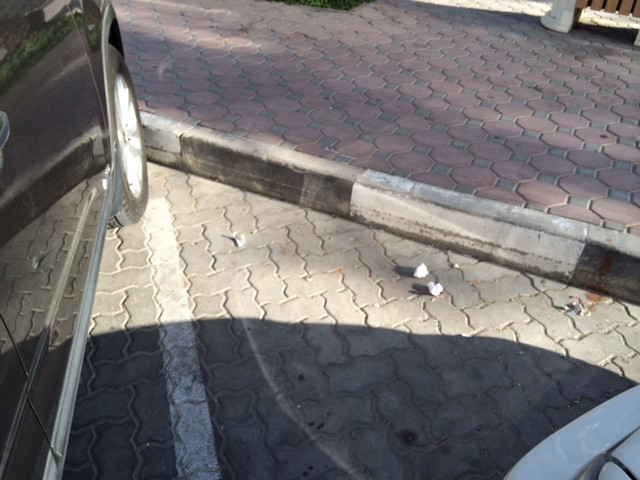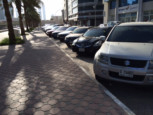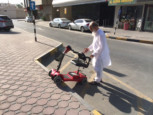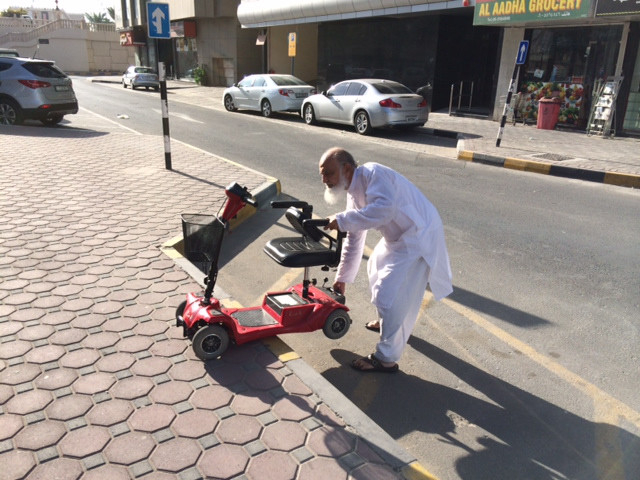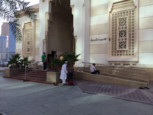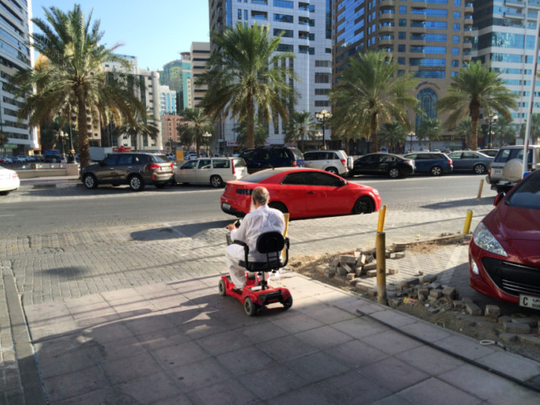
We live in the Al Majaz 3 area of Sharjah. Our building is adjacent to the Al Qasba canal. Almost every day, especially in the evenings, we see people going for a walk or meeting for an occasion. There are a lot of families who visit with children in prams and the area is frequented by the elderly in wheelchairs or on mobility scooters.
My 78-year-old father is one of them. However, when he goes to pray at the mosque in the area, on his mobility scooter, he faces a lot of trouble getting around. The pavements are not accessible to those on wheelchairs.
The distance between our home and the mosque is one kilometre, which is a lot for him, five times a day. Additionally, he has to get off his scooter at several points in order to carry it onto the pavement (as seen in photographs).
I request the relevant authorities to address the matter and make a ramp to make the area accessible on wheelchair.
The reader is based in Sharjah. Be a community reporter. Tell us what is happening in your community. Send us your videos and pictures at readers@gulfnews.com
Mariam Othman Yousuf, Director of the Rashid Pediatric and Therapy Centre, said:
“Small steps like installing elevators in malls, parking lots, buildings and even carparks are important. The architectural aspect is well thought out. However, we do need to work on the technical side. More specialists are required. I believe that the first thing should be awareness. The public should know that people with disabilities or special needs are part of our society, too. We cannot ignore them and need to believe that with just a few facilities we can make not just their lives easier but also the lives of those who are taking care of them. If a parent has a child in a wheelchair, he or she would appreciate elevators in car parks or toilets designated for people with disabilities. Awareness is key and needs to begin at the community level. If you look at Dubai, so much has changed in the past 15 years. Whenever a new building or project is planned, people with disabilities are kept in mind.”
Caroline Joyce Seemar, Manager of the Riding for the Disabled Association of Dubai, said:
“I think the UAE has excellent facilities and access for those in wheelchairs. I cannot find fault anywhere — in the airports, malls, hotels and even at the Metro stations. People struggle when they leave the UAE and visit Europe or other Asian countries. There are old cities and it is hard and even expensive to upgrade the existing architecture to provide facilities. Additionally, you need trained staff to help out. Because the UAE is a fairly new country, they have put a lot of thought into it and have done a fantastic job in catering to the needs of people with disabilities. People do not want to be dependent on others due to their disability. They would want to work on their own — that is what gives them confidence. This works for everyone else, too, because everyone is independent.”
Facts on what the UAE has done already:
According to a Gulf News report published in May 2011, there is a law in place in Sharjah to ensure that each building in the emirate is accessible to people with special needs. However, there are a number of buildings where construction design has failed to abide by the law and other buildings with poor accessibility facilities. A meeting was held in 2011, at the Housing Department in Sharjah, in coordination with the Directorate of Public Works and Sharjah City for Humanitarian Services, and it was decided that all residential buildings and government facilities would be designed to be easily accessible to disabled people.
According to a Gulf News report published in December 2013, Sharjah Police launched a new home service for disabled people in October 2012 titled Nouselk, which means ‘we will reach you’. It is meant for people who are unable to get to police stations. The number for the service is 09 2348111.
Al Ain Police offers a similar service, according to a Gulf News report published in October 2013. The elderly and those with disabilities will no longer have to visit police departments as a new Ministry of Interior service will deliver and process all paperwork at these residents’ homes.
Roads and Transport Authority (RTA) in Dubai issue special needs’ tourists with a parking permit that will be good for the period of their visit visa. These can be used anywhere in Dubai.
The permanently disabled people (Emiratis or residents) can obtain free Nol Blue cards for use in public transport across Dubai.
Elevators have been installed in all the Dubai Metro stations and special seating areas have been designated on trains.
The RTA buses are fitted to carry passengers in wheelchairs.
Special taxis with wheelchair access are available on call. They can be booked by calling the Dubai Taxi Corporation’s dispatch centre at 04 2080808.
FEDERAL LAW:
The Federal Law No. (29) of 2006 concerning the rights of people with special needs was issued in 2006 by Shaikh Khalifa bin Zayed Al Nahyan, President of the UAE and the Ruler of Abu Dhabi. This is the first law in the UAE to protect the rights of people with special needs. The law provides for equal care, rights and opportunities for people with special needs in education, healthcare, training and rehabilitation, and it aims to ensure their rights and provide all services within the limits of their abilities and capabilities.
The law guarantees a job quota for people with special needs in the public and private sectors, and focuses on increasing accessibility to public buildings and residences. It also places emphasis on integrating people with special needs into public and private schools, and takes into account retirement considerations, allowing people with special needs to retire with full benefits earlier in their career.
Information source: Ministry of Social Affairs’ official website
Editor’s Note: Gulf News repeatedly raised the issue with Sharjah Municipality. However, they failed to respond to both phone calls and email requests.


